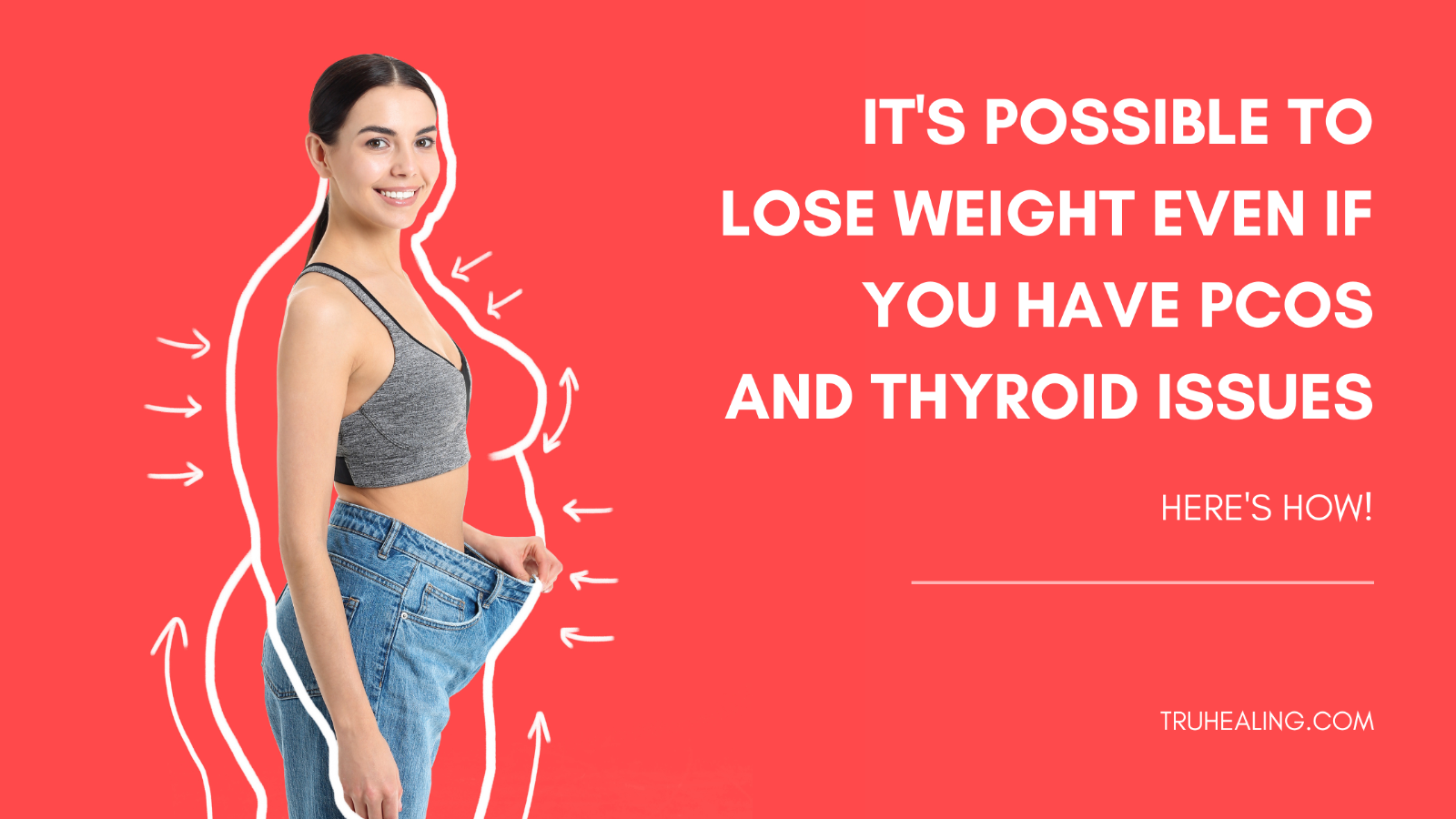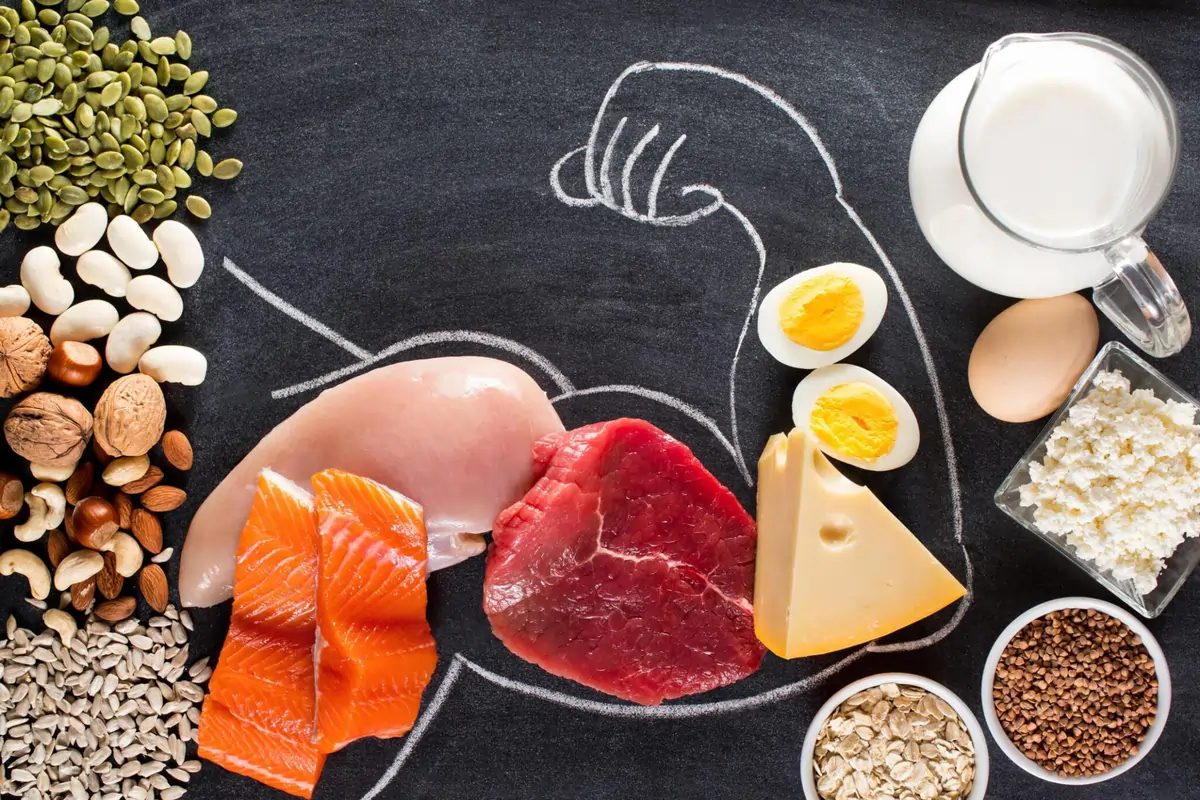IT'S POSSIBLE TO LOSE
WEIGHT EVEN IF YOU HAVE PCOS AND THYROID ISSUES

Any veteran of the "diet wars" is all too familiar with the stress and strain of never being able to claim victory over the scale. And once we turn 35, that battle feels even more difficult. Tactics that used to work suddenly fall short, while a new wave of symptoms like brain fog, low energy, and insomnia hit. "The almost universal symptom is weight gain, But even if we have PCOS and Thyroid issues, even if we are 40 plus, we can lose weight and keep it off." The key is to understand and Balance your hormones, which are fluctuating and not fixed.
Why Weight Gain is So Common
Gaining unwanted pounds is an inevitable part of PCOS and THYROID PROBLEMS, especially for most women, especially when they turn above 35. But what exactly causes that weight gain in midlife? It has a lot to do with hormonal fluctuations. At the same time, youthful reproductive hormones decrease as we approach menopause, and other hormones that age the body (like insulin and stress cortisol) increase.
This hormone shift causes inflammation to rage throughout
the body. And scientists know that body-wide inflammation triggers fat cells to
shut off their fat-burning powers. Quickly, the body gets locked in a
phenomenon called "weight-loss resistance," which affects up to 90%
of women over 45. Unfortunately, this topic remains in the background in
medical Colleges, and most Gynaecologist do not receive enough training in how
to balance Hormones holistically other than prescribing birth control pills,
metformin, and thyroid pills, which can mask the symptoms short term, but do
nothing to heal the body long term.
Understanding that our
risk is about 1 in 8 women in our lifetime, let's now shift our focus to
prevention strategies.
How Weight Drives Worsening PCOS, Thyroid, and Perimenopause Symptoms:
Even if most doctors aren't helpful in this area, there are good reasons to want to fight off weight gain on your own. According to research, as a woman's size increases, her symptoms worsen.

How to Hormonal Weight Gain
The good news is that it doesn't take a major diet overhaul to rebalance hormones and melt fat with PCOS and Thyroid issues. Surprisingly, it's not about adopting one diet for the rest of your life.
Through clinical research, I discovered that switching up your eating habits weekly based on where you are in the menstrual cycle reboots your metabolism, making weight loss easier. Of course, diet is not everything when it comes to balancing your hormones, but it's the foundational place to begin with.
Why Diet Switching Works for Women:
"Just like you have to change up your exercise routine,
you have to change your eating routine to keep your metabolism on its toes. As
your hormones change through the cycle, you can honour that and support the
body by tweaking your diet...By switching things up, we make the body more
insulin-sensitive. In the She-to method, we also focus on period rest to reduce
cortisol and boost happiness Hormones. Oxytocin (the "joy" hormone)
further counteracts the inflammatory stress of cortisol while naturally
suppressing appetite.
Metabolic Switching Targets Belly Fat.
Quick-switching between plans can melt away the weight that accumulates in the midsection of the body. In a University of Southern California study, subjects on a short-burst diet had 86% less belly fat after three months than those on a standard diet. Study author Valter Longo, PhD., has seen that dieters doing short detoxes take 413% more inches off their waist compared to nondieters. He assures, "The body is better able to regulate everything after five days. It goes back to functioning optimally."
These short dietary "resets" also guard against weight-loss resistance and its related health risks.
Mini Diet Plans Lead to Amazing Success.
"These programs are responsible for tens of thousands of women preventing and reversing hormonal symptoms.
Start managing hormonal weight gain today...
Choose one of the following mini plans to start rebooting your metabolism. You can follow each one for a week. No matter which plan you choose, always eat three meals a day, an early dinner, and avoid sugar, alcohol, and processed carbs.
Mini-Plan 1: FOLLICULAR OVULATION PHASE Plant-based

For 2 WEEKS, you'll pause acid-forming foods like meat and cheese and enjoy three alkaline plant-based meals a day. Reach for low glycemic fruits, veggies, beans, tempeh, tofu, lentils, and seeds, plus healthy fats and healing spices like garlic. For a sample meal, try hearty red lentil soup made with veggie broth.
This plan is great for women struggling with constipation. Most of us don't get enough fiber and don't realize how constipated we are, but this fiber-rich plan restores regularity while maintaining the ketosis of a low-carb diet.
Chew well. To extract the healing properties of hard-to-break-down plant proteins, slow down and chew your food. Not only will you digest food more easily, but research shows that chewing 40 times per bite curbs the production of hunger hormones.
Eat probiotic foods, like coconut milk yogurt and fermented sauerkraut, which heal the microbiome to improve digestion and ease pain and bloat.
Mini-plan 2: Do it Once a Week in the

To boost energy and improve your mood, you'll pause solid foods on this liquid detox plan, built around juices, broth, caffeine-free teas, and smoothies made with leafy green veggies, low-sugar fruit, and nuts. Try whipping up a delicious smoothie bowl made with 1 cup unsweetened cashew milk, 1 cup spinach, 1⁄2 avocado, and a dash of cinnamon. Top with berries and unsweetened coconut.
This plan is ideal for people who are plagued by anxiety or worry. "In one smoothie, you can sip a combination of nutrients that reduce cortisol, normalize insulin, regulate estrogen levels, improve mood, and increase metabolism." In one study conducted by Thomas Jefferson University Hospital, all the women on a similar plan felt less anxious and depressed in a week.
During this fast, Feast on gratitude! "This is a detox, so you'll also detox from negative thoughts and focus on what you're grateful for; this quiets the brain to reduce cravings.
Add fat. Start the day with 2 Tablespoons of olive oil and a squeeze of lemon. It gives the body nutrients that end cravings, and the weight-loss results are insane.
Mini Plan #3: SHETO MENSTRUAL PHASE, LUTEAL PHASE
PLAN:

During menstruation, you can limit carbs and pause inflammatory foods, namely grains, eggs, and nightshades (like tomatoes and eggplant). Focus mostly on eating healthy fats (avocado and olive oil), then protein (meat, fish), and limit carbs from fruit and veggies to 40 daily grams. Your dinner formula: 1 protein serving + 2 servings of low-carb vegetables + 1 to 2 fat servings. Try this sample meal: Stir fry with sliced chicken thighs plus steamed veggies and cauliflower rice.
During LUTEAL PHASE, add some grains and greens to balance your hormones.
This mini plan is great if you're struggling with blood sugar. It stabilises levels, which is good news for women who suffer from hot flashes caused by blood sugar–impacted changes in blood pressure. Also, Eat broccoli. Cruciferous veggies contain natural compounds that halt the expansion of fat cells while reducing a "bad" form of synthetic estrogens in the body.
Stay hydrated. Drinking water is critically important when starting a new regimen to help your body with detoxification.
What to do After Rotating Through your Mini Plans
To keep slimming after cycling through these dietary pauses:
- Introduce some carbs (healthy non-keto meals) back into your routine.
- If you find symptoms or weight creep back, return to the mini plans to reset.
- Make your intuitive rotation diet plan based on the phases of your menstrual cycle.'
- Get your ROOT CAUSE HORMONE TESTS done and take customized botanicals and supplements. Working with a hormone expert and taking appropriate supplements helps to break the weight plateau.
- Keep your plan alkaline predominantly.
- Focus on sleep and stress management.
- Boost oxytocin, the happiness Hormone! Remember that LOVE IS ALKALINE…
Environmental Factors
Certain environmental factors can influence your risk of developing breast cancer:
- Exposure to ionising radiation
- Contact with DDT and pesticide contaminants (although research findings vary)
- Smoking and exposure to secondhand smoke
- Obesity, particularly gaining weight in adulthood.
- Alcohol consumption
- Having your first child at an older age
- Never giving birth
- Experiencing menopause at a later stage
- Starting menstruation at an early age (before 12 years old) which exposes women to hormones for a longer period
- Taking oral synthetic estrogen and progestin together for over five years
- Prolonged hormone replacement therapy in menopausal women using Premarin and Provera can increase the risk by 8 per 10,000 women.
Wishing you great luck in your weight loss journey…..